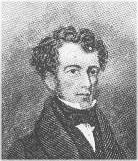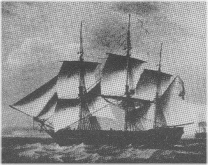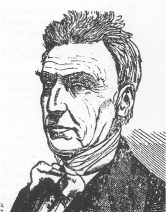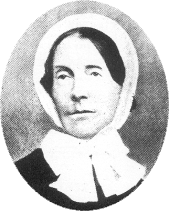|
John Thomas' Early Years and Medical Studies John Thomas was born in Hoxton Square, London, on 12th April, 1805. His father, Rev. John Thomas, had been brought up to the East India Civil Service, but as a young man, left for the ministry. He became a pastor for several Independent Churches. While living with his family in Chorley, Lancashire, John began his medical studies under a private surgeon at the age of 14. Two years later, John’s family returned to London, leaving John to continue his medical studies in Chorley. Six months later, John resigned his membership of the church. Soon after this he returned to London, and was put under a general practitioner near Paddington, to continue his medical studies. After two years, John joined the students at St Thomas’s hospital, where he attended lectures for three years. During part of this period, he acted as demonstrator of anatomy in a school associated with one of the London hospitals. John finished his medical course, obtained his diploma and after spending a year as companion to a London physician, commenced his own practice at Hackney. He practiced at Hackney for three years.
Emigration to America The year was now 1832. The Doctor’s father, Rev. Thomas, had left the Independents for the Baptists and had also caught American emigration fever. Dr. Thomas decided to check out America for his father, and departed for New York aboard the Marquis of Wellesley, acting as the surgeon for the 70 passengers and 19 crew members on the voyage. Foul weather set in, and for two weeks the ship was driven by strong winds and heavy seas until the main-mast snapped off, carrying away much of the sails with it. The sea carried everything movable from the deck and tossed the ship about ‘like a chip in a boiling cauldron’. The ship was blown 250 miles off course and ran aground off Sable Island. She struck the bottom twelve times in succession, striking horror into both the passengers and crew. The chances of survival were looking grim, and for the first time Dr. Thomas was faced with the uncertainty of not knowing what would become of him. He had not previously taken much interest in religion, but at this point he concluded that the best thing to do in the circumstances would be, as the waves were closing over him, to go down with the prayer upon his lips, "Lord have mercy upon me for Christ's sake". At the same time he determined within himself that if ever he got on terra firma again, he should never rest till he found out the truth of the matter, that he might no more be found in such an uncertain state of mind. He did get to shore again because, aided by a change of wind, the ship lifted off with pumps working hard to get rid of the water gushing in, and although severely damaged, it arrived in New York after eight weeks at sea. On leaving the ship he went to a boarding-house in the city. His father arrived just three days later, having become impatient and started for America three weeks after his son. The Doctor did not forget his resolution to seek for the truth. He visited a Presbyterian church in New York but was unimpressed by them. Having letters of introduction to both a Baptist preacher and a professor of Surgery from his father’s associates in New York, they set off on a tedious journey to Cincinnati. He had been told that the western people were very hospitable but very much infected with ‘reformation’. The Doctor was struck with the remark, which was the first allusion to Campbellism, with which he was to have close association.
Association With The Campbellites They arrived at Cincinnati and were invited to Major Daniel Gano’s home, the Clerk of the Supreme Court of the U.S., a Campbellite. During their conversation, the Major commenced talking about ‘the ancient gospel and order of things’. The Doctor thought this a strange discussion, but out of politeness listened to his host and accepted a pamphlet on the subject. He did not plan to read it though, wanting to avoid bias. A few days later, Dr Thomas was again invited to the Major’s home, along with the primary founder of Campbellism, Mr Walter Scott. Amongst other subjects, Mr. Scott spoke on the need for the Doctor to be baptized. The Doctor saw no reason, but said if Mr. Scott could show from Scripture that any person had been baptized as soon as he believed, he should give up his opposition. Mr. Scott, with much satisfaction, gave the example of the Ethiopian eunuch in Acts 8. The Doctor had to admit defeat, although he tried unsuccessfully to escape. So, at 10pm, by the light of the moon, Dr. John Thomas was immersed in the Miami Canal ‘for the remission of sins’. Dr. Thomas, now immersed, had become a member of the Campbellite sect. After living in Cincinnati for 7 months, the Doctor found it to be flooded with doctors. He decided to return to the Eastern states, and in April 1833 headed for Wellsburg, Virginia. There he met Alexander Campbell, the recognized leader of the ‘Disciples of Christ’ sect, also known as the Campbellites. To escape being pressured into giving Scriptural exposition (which he felt himself unqualified for), the Doctor decided to go to Baltimore via Washington, Pennsylvania. But here again, the Campbellites wanted him to be their preacher. His object was to be a Doctor, not a preacher so he moved on to Balimore then to Philadelphia, where the same problem occurred.
Editor In 1834 in Philadelphia, two important events occurred. The first, the Doctor married Ellen Hunt. She proved a loyal helpful wife for the Doctor. The type of life which the Doctor subsequently lived, placed tremendous strain upon his wife who was physically handicapped, but she knew her husband’s work was important. She once said, ‘The Doctor belongs to the the public and was not much of a woman’s man’. The second event: he commenced his editorial career. A member of the Philadelphia congregation, suggested to the pastor, Mr. Ballantyne, that a paper should be started to advocate the principles of the Reformation. He then spoke to the Doctor about the project, asking him to suggest a name and write a prospectus. Dr. Thomas selected the title, the ‘Apostolic Advocate’ and drew up a prospectus describing the venture. Mr. Ballantyne was to prepare the periodical, but due to ill health asked Dr Thomas to take over the editing of the booklet. The first number appeared in May with 1,000 copies being distributed. It was composed almost entirely of the Doctor’s own contributions. Before the second number of the ‘Apostolic Advocate’ was printed, Dr. Thomas moved to Richmond. There was no preacher there and Dr. Thomas was offered a salary to preach. He said he would preach but refused the salary, saying he would ‘rather live on bread and cheese, and maintain his independence of thought and action, than submit himself to the power of committees and trustees.’ Break With Campbellism He commenced his medical practice to support himself financially, and at the same time continued with the ‘Advocate’. After a prosperous start, the medical practice declined, due to continual absences for preaching. Friction with the Campbellites was also developing, due to the Doctors article published in the ‘Advocate’ on ‘Ana Baptism’. In a letter to Alexander Campbell, the Doctor wrote ‘Immersion is not baptism … it depends on the candidate’s first assurance that the blood of Jesus Christ cleanses from all sins, and that he rose from the dead, that makes immersion into water real baptism.’ Before the controversy on re-immersion had closed, many doctrines of the Campbellites were being questioned by the Doctor. Not having arrived at a conclusion, he wrote a letter to his father in London containing 34 questions hoping that he would with his knowledge of the scriptures supply the answers. The Doctor also published them under the title of ‘Information Wanted’ in the Advocate. The general reaction to the article ‘Information Wanted’ was animosity, many denouncing it as a new and infidel creed. Undiscouraged, Dr. Thomas increased his determination to understand these doctrines. His zeal for truth is seen in his words "If wrong, to get right, and when righted, to defend the right, maintain the right, and overthrow the wrong, or perish in the attempt". Antagonism continued to grow between Dr. Thomas and Mr. Campbell. Towards the end of 1836, the Doctor moved from Richmond to a farm at Paineville. He decided to move to a farm to support the family and allow more time to continue with the Apostolic Advocate. He began printing from his own press on his farm. The breach with Alexander Campbell continued. But in 1838, Campbell visited Paineville, and a debate was arranged between Dr. Thomas and Alexander Campbell on 3 Issues:
Dr. Thomas, so reconciliation could be achieved, agreed not to pursue the subject of the mortality of man. Farmer In 1839/40, the Doctor and his family again relocated. This time to a farm in Longrove, Illinois. There was no house on the new farm, so the publication of the Apostolic Advocate was temporarily suspended while Dr. Thomas built one. After six months of farming, the Doctor decided that the work was too isolating and left little time for writing. So they left the farm in the hands of someone else and moved 25 miles away to St. Charles. Here Dr. Thomas commenced the publication of a weekly newspaper in the town of Henepin. He also became President and Lecturer of Chemistry in the Franklin Medical College. In 1842, the Doctor discontinued the weekly newspaper and commenced a monthly magazine called "The Investigator". He also took every opportunity to publicly preach. In 1844-45 the Doctor began publishing a new magazine, the "Herald of the Future Age." He now realized that the approaching reign of Christ was identified with the true gospel. In 1846 Dr. Thomas, encouraged by a friend to New York and gave 10 lectures on "The Deep Things of God." He summarized the themes of his lectures in the ‘Herald’ into 30 points relating to the nature of man, the kingdom, the Promises and Christ’s relation to them and the millennium.
Source: "The Life of John Thomas" |



